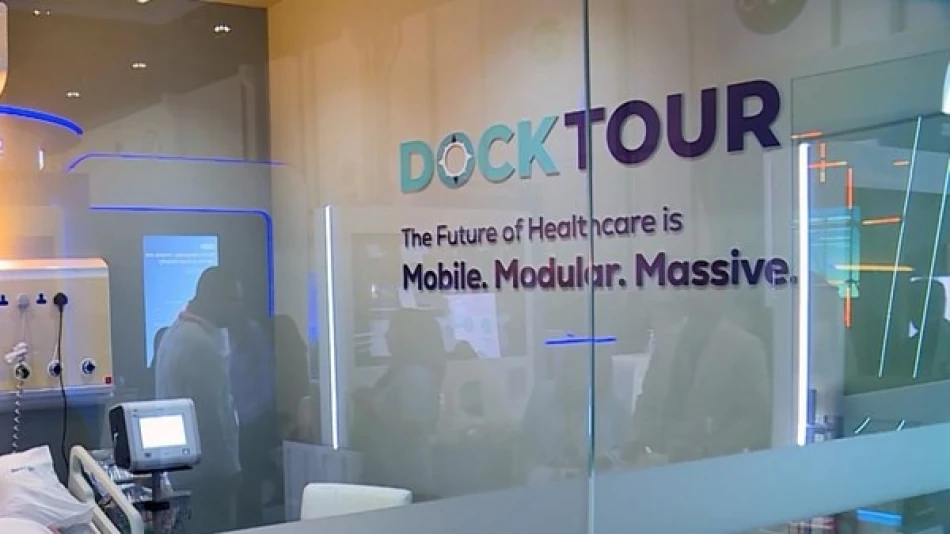
Emirati Marine Medical Project 'Doctor' Provides Essential Pharmaceutical Aid to Angola
UAE's "Doctor" Project Delivers 800,000 Essential Medicines to Angola in Major Healthcare Diplomacy Push
The UAE has significantly expanded its healthcare influence in Africa through a landmark donation of 800,000 essential medicines to Angola, delivered via the "Doctor" project—a joint maritime medical initiative between Abu Dhabi Ports Group and Burjeel Holdings. This strategic healthcare diplomacy move underscores the Emirates' growing soft power ambitions across the African continent, positioning Dubai and Abu Dhabi as key healthcare hubs for emerging markets.
Strategic Partnership Addresses Critical Healthcare Gaps
The medicine shipment was formally handed over through Angola's Ministry of Health in a ceremony attended by high-level officials from both nations, including Angola's Health Minister Silvia Lutucuta and Mohammed Aissa Al Manhaali, Regional CEO of Abu Dhabi Ports Group. The donation includes vital antibiotics, pain relievers, and treatments for chronic diseases—addressing some of Angola's most pressing healthcare challenges.
The donated medications target widespread health issues including acid-related disorders, diabetes, bacterial infections, allergies, hypertension, and cardiovascular diseases. For Angola, a country where healthcare infrastructure remains underdeveloped despite its oil wealth, this donation represents critical support for reaching underserved communities.
UAE's African Healthcare Expansion Strategy
The "Doctor" project represents more than humanitarian aid—it's a calculated expansion of UAE healthcare influence across Africa. By integrating logistics, standardized infrastructure, training, and emergency response into a single comprehensive platform, the initiative mirrors successful healthcare diplomacy models deployed by China and Turkey in recent years.
Economic and Geopolitical Implications
This healthcare diplomacy serves multiple strategic purposes for the UAE. First, it strengthens bilateral trade relationships with resource-rich African nations like Angola, potentially opening doors for broader economic partnerships. Second, it positions UAE companies as reliable healthcare partners, creating long-term market opportunities for Emirati pharmaceutical and medical technology firms.
The timing is particularly significant as global powers compete for influence in Africa. While China focuses on infrastructure through the Belt and Road Initiative and European nations emphasize governance programs, the UAE is carving out a niche in healthcare delivery—a sector with immediate, visible impact on local populations.
Market Opportunities and Healthcare Infrastructure Development
For investors and healthcare companies, the UAE's African healthcare push signals emerging market opportunities. Angola's healthcare sector, historically underfunded despite the country's oil revenues, represents significant potential for medical equipment suppliers, pharmaceutical distributors, and healthcare service providers.
Safar Ahmed, Co-CEO of Burjeel Holdings, emphasized the project's broader mission: "We are committed to improving healthcare access throughout Africa. Through the Doctor project, we aim to provide medicines while bringing hope and reassurance to communities in need. This collaboration with Angola's Ministry of Health represents another step toward our mission of bridging healthcare gaps and creating sustainable impact."
Comparison with Regional Healthcare Diplomacy
The UAE's approach differs notably from other Gulf healthcare initiatives. While Saudi Arabia focuses primarily on hajj-related medical services and domestic healthcare transformation, the Emirates is building a pan-African healthcare network. This strategy resembles Singapore's healthcare hub model, where the city-state leveraged its logistics expertise to become a regional medical center.
Long-term Impact on UAE-Africa Relations
The "Doctor" project aligns with the UAE's broader Vision 2071 goals of enhancing sustainable development and improving quality of life in partner nations. By addressing immediate healthcare needs while building long-term infrastructure capabilities, the UAE is positioning itself as an indispensable partner for African governments seeking healthcare modernization.
This initiative also demonstrates how smaller, wealthy nations can exercise outsized influence through targeted sector expertise. Rather than competing directly with larger powers on infrastructure or military cooperation, the UAE is building relationships through healthcare—a universally appreciated form of assistance that generates significant goodwill and economic opportunities.
Most Viewed News

 Layla Al Mansoori
Layla Al Mansoori






